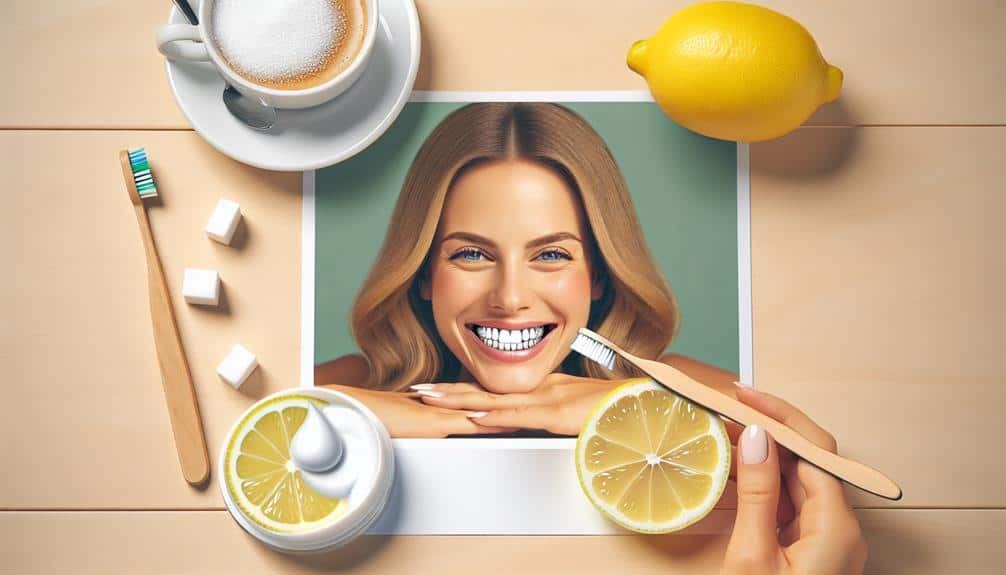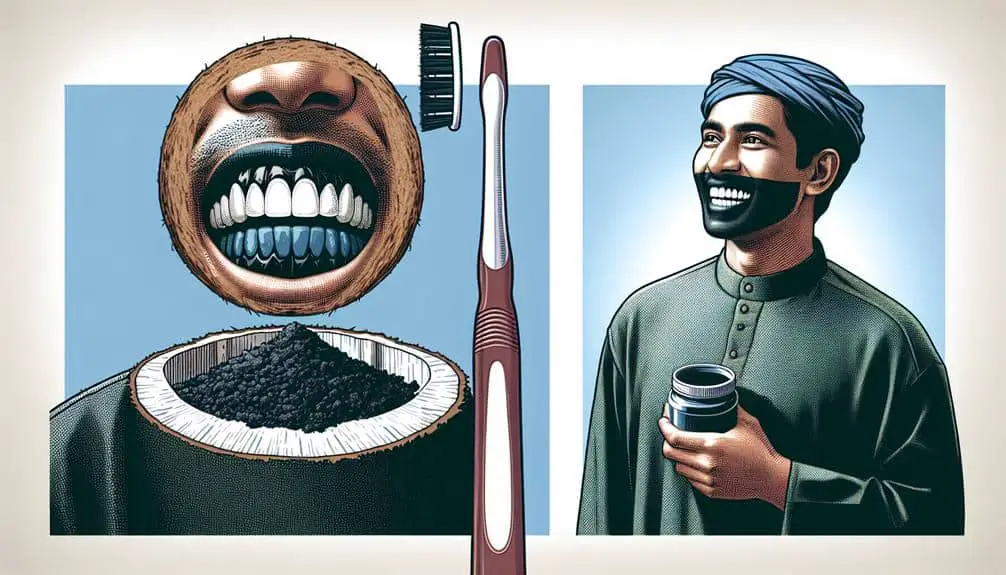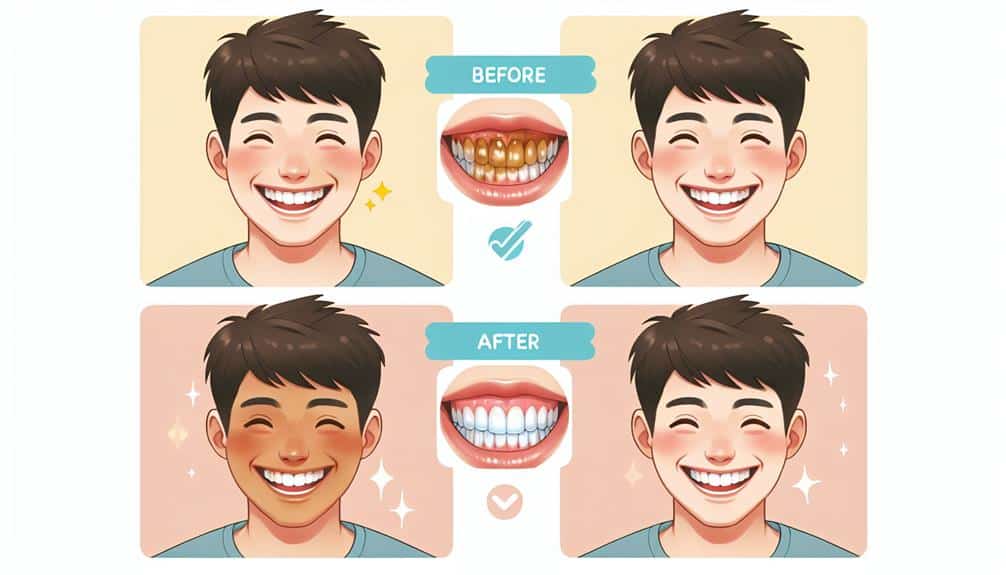To minimize coffee stains on your teeth, limit how much coffee you drink daily. Less coffee means less contact with staining agents like chromogens. Try sipping through a straw placed towards the back of your mouth to reduce direct contact with teeth. Rinse your mouth with water after coffee to wash away pigments and acids. Schedule regular dental cleanings to prevent stains and get personalized oral care guidance. Consider using teeth whitening products for a brighter smile. Following these strategies can help you maintain a stain-free smile with your daily coffee indulgence.
Key Points
- Limit coffee consumption to reduce staining agents contact with teeth.
- Use a straw to minimize direct contact of staining agents with teeth.
- Rinse mouth with water after coffee to wash away pigments.
- Regular dental cleanings prevent accumulation of stains and offer guidance.
- Try teeth whitening products like strips or trays to combat coffee stains.
Limit Coffee Consumption
To lessen the risk of coffee stains on your teeth, consider reducing your daily coffee intake. Limiting your coffee consumption can greatly decrease the amount of staining agents that come into contact with your teeth. Coffee contains chromogens, compounds that can adhere to the enamel of your teeth and cause discoloration over time. By cutting back on your intake of coffee, you can lessen the exposure of your teeth to these pigmented molecules, thereby lowering the likelihood of stains.
In addition to reducing intake, it's also important to maintain regular dental visits for professional cleanings. Dental cleanings performed by a dental hygienist can help remove surface stains caused by coffee consumption. These cleanings can target areas that may be difficult to reach with regular brushing and flossing, effectively minimizing the impact of coffee stains on your teeth. By combining a decrease in coffee consumption with routine dental visits, you can proactively combat the effects of coffee on your dental aesthetics.
Use a Straw
Consider using a straw when enjoying your coffee to help minimize the direct contact of staining agents with your teeth. By sipping your coffee through a straw, you can reduce the exposure of your teeth to the pigments that cause staining.
When using a straw, make sure it's placed towards the back of your mouth to further prevent the coffee from coming into contact with your front teeth. This simple adjustment can make a significant difference in preventing coffee stains on your teeth.
If you prefer not to use plastic straws, there are eco-friendly alternatives available such as reusable metal or silicone straws. These options not only help in reducing waste but also serve the purpose of protecting your teeth from staining agents present in coffee.
Experiment with different straw alternatives to find the one that best suits your preferences while effectively minimizing coffee stains on your teeth.
Rinse Mouth After Coffee
After consuming coffee, make it a habit to rinse your mouth with water to help reduce the likelihood of staining on your teeth. This simple practice is one of the most effective preventive measures you can take to maintain good oral hygiene and minimize the impact of coffee on your teeth.
Rinsing your mouth after drinking coffee helps wash away the pigments and acids present in coffee that can lead to discoloration and enamel erosion over time.
Regular Dental Cleanings
Regular dental cleanings by a professional hygienist are essential for maintaining peak oral health and preventing coffee stains on teeth. These cleanings go beyond what regular brushing and flossing can achieve, as they involve the removal of built-up plaque and tartar that contribute to discoloration.
Here are some key points to bear in mind:
- Preventive Measures: Regular cleanings help prevent the accumulation of stains by keeping your teeth clean and healthy.
- Professional Advice: Hygienists can offer personalized guidance on how to best care for your teeth and prevent coffee stains.
- Early Detection: Cleanings also allow for the early spotting of any potential issues, such as enamel erosion or cavities, which can worsen the appearance of stains.
- Specialized Tools: Hygienists use specialized instruments to clean hard-to-reach areas effectively, ensuring a thorough cleaning.
- Polishing: The polishing done during cleanings helps remove surface stains, leaving your teeth looking brighter and less prone to coffee stains.
Try Teeth Whitening Products
To enhance the brightness of your smile and combat coffee stains on your teeth, explore the effectiveness of teeth whitening products available in the market. Teeth whitening options come in various forms, including whitening toothpaste, strips, trays, and professional treatments. Whitening toothpaste often contains mild abrasives or gentle polishing agents to remove surface stains effectively.
Whitening strips are thin, nearly invisible strips coated with a peroxide-based gel that can whiten your teeth. Trays, custom-fitted by a dentist, are filled with a peroxide-based whitening solution and worn for a specific period. Professional treatments, like in-office whitening procedures, offer quick and significant results under the supervision of a dental professional.
While teeth whitening products can help combat coffee stain prevention, it's crucial to follow instructions carefully to avoid potential side effects like tooth sensitivity. Also, it's advisable to consult with your dentist before starting any whitening regimen, especially if you have underlying dental conditions.
Frequently Asked Questions
Can Using a Whitening Toothpaste Help Minimize Coffee Stains on Teeth?
Using whitening toothpaste may help minimize coffee stains on teeth. Its effectiveness lies in removing surface stains caused by coffee consumption. Consistent use, along with proper dental hygiene, can aid in preventing coffee stains.
Are There Any Specific Foods or Drinks That Can Help Prevent Coffee Stains on Teeth?
To prevent coffee stains on teeth, you can incorporate dietary habits like consuming crunchy fruits and vegetables that can help scrub away stains. Drinking water after coffee can also help wash away pigments. Maintain good oral hygiene habits for best results.
How Often Should I Replace My Toothbrush to Help Prevent Coffee Stains on Teeth?
To help prevent coffee stains on teeth, replace your toothbrush every 3-4 months. Proper brushing technique and ensuring that the toothbrush bristles are in good condition can aid in maintaining oral hygiene and minimizing staining from beverages like coffee.
Can Drinking Coffee Through a Reusable Straw Still Cause Stains on Teeth?
Sipping coffee through a reusable straw can still lead to teeth stains if not careful. The straw helps a bit by directing the liquid away from your teeth, but it's not foolproof. Consider enamel protection methods for added defense.
Are There Any Natural Remedies or DIY Methods to Minimize Coffee Stains on Teeth?
To minimize coffee stains on teeth naturally, try oil pulling with coconut oil, brushing with baking soda, using turmeric paste as a gentle abrasive, and rinsing with diluted apple cider vinegar. These methods can help maintain a brighter smile.



